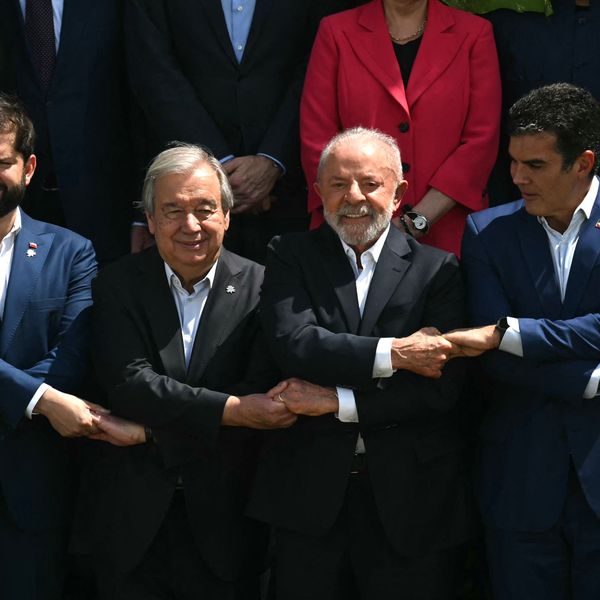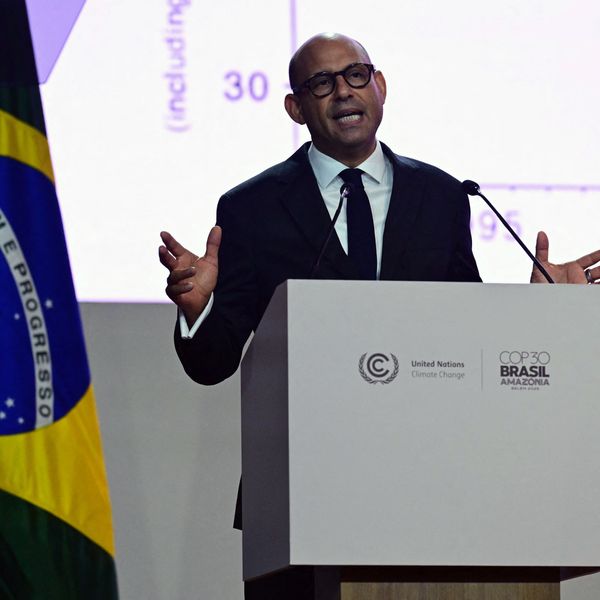Back in 2006, when I was a student at Middlebury College in Vermont, a group of friends and I teamed up with Bill McKibben, our "scholar-in-residence" on campus, to organize a walk across the state to call for climate action.
It being Vermont, and Bill being a literary kind of guy, we started our pilgrimage with a few dozen people at the Robert Frost cabin in the hills above campus. As we made our way along the back roads of the Champlain Valley over the next few days, our numbers began to swell. By the time we reached Burlington, over a thousand people had joined the march -- a practical revolution in our small state, and enough to convince every candidate running for federal office to sign onto our demand to cut carbon "80% by 2050."
I have many fond memories from the march, but one of the most meaningful is of a sermon that Bill gave at a church in Charlotte, Vermont on the second to last day of our journey. As an agnostic kid from Cambridge, Massachusetts, churches weren't something I was very familiar with. I couldn't recite a single bible verse, didn't know the right way to cross myself, or even if these were the sort of church people that did that sort of thing. But I'd learned enough in my few years of college activism to recognize when a crowd was fired up, and to sense that special energy that's generated when a community gets together around a common purpose.
That morning in church, I could feel my skin crawl with the static electricity in the air. Bill started his sermon by talking about the Book of Job and how it could serve as a parable of man's changing relationship with nature, and by extension, the divine. (You can read the whole sermon here). The sermon was funny, poetic, and revealing. But the thing that really stood out to me was the way faith could infuse activism with a whole new sense of energy.
Standing up the pulpit, Bill implored the audience to join the fight against climate change, "If you care about social justice. If you care about the injunctions that Jesus over and over again tells us to love our neighbor. If that matters to you, then this is the issue that matters most of all because we've never figured out any way to impoverish and wreck the lives of marginal people around the world more effectively than to destroy the basic physical stability on which those lives depend."
Yes, this was Vermont and he was preaching to the choir (literally) but I'd rarely seen people respond in such a way to the topic of global warming. This choir suddenly didn't want to just sing a lament for the planet--they were ready to march out of the church and fight for it. Bill went on to speak about the particular role that faith communities could play in the fight for climate justice:
One of our problems in our society and our economy is that we can't imagine anything other than more anymore. As President Clinton infamously said during his election campaign, "It's the economy, stupid." Well communities of faith, churches and synagogues and mosques are the last institutions in our society that can really posit some reason other than accumulation for existence. That have some idea about why it isn't just more that's the place where we're headed. And that gives them potentially enormous power to do what the work of the church is, which is to be subversive - to be countercultural - to run contrary to the dominant currents of the world in which we live. And that's beginning to happen, you can sense its power in a lot of ways.
Now, nine years later, the sermon seems remarkably prescient. Since our walk across Vermont, I've worked nearly nonstop with Bill and a growing group of friends and colleagues around the world. Together, as 350.org, we've tried to help build a movement that can stand up to the dominant forces that are destroying our climate, namely the fossil fuel industry, and posit a different direction for our economy and society.
That work took on special force when we got involved with the fossil fuel divestment movement back in 2012. At the time, a small handful of colleges like Swarthmore were running divestment campaigns. Since then, the effort has spread to thousands of universities, foundations, and churches around the world. Yesterday, we announced that more than 400 institutions representing $2.6 trillion in capital have made some form of divestment commitment: a 50 fold increase in commitments since just last year. Oxford University has called the effort the fastest growing divestment campaign in history.
A lot of people ask me what I think accounts for the movement's success. I think the secret can be found back in that church in Vermont. The divestment campaign is rooted in a clear moral truth: if it's wrong to wreck the planet, it's wrong to profit from that wreckage. When we're making the case for divestment, we speak the language of financial returns, carbon bubbles, and economic impact, but the real power of the campaign, the argument that our targets can't avoid, is the moral one.
That's probably why faith institutions have been such a powerful force in the divestment fight. Dozens of religious institutions have joined the campaign over the last three years, including the World Council of Churches, which represents half a billion Christians in 150 countries. This May, the Church of England announced it had sold PS12m in thermal coal and tar sands. In June, Georgetown, one of the largest Catholic universities in the country, divested from coal (students are now pushing for full divestment). A month later, Islamic leaders endorsed divestment and called for a rapid phase out of fossil fuels in a declaration on climate change.
And now there's the Pope. While this June's encyclical didn't include the word "divestment," Pope Francis' message couldn't have been more clear: unless we can change the underpinnings of our economy, we won't be able to confront the climate crisis that threatens humanity.
A few days after the encyclical dropped, the New York Times published an article, "Papal Encyclical Heartens Proponents of Fossil-Fuel Divestment." The piece quotes our friend Bob Massie, wrote a book about the movement to divest from apartheid South Africa and has become a leading proponent of fossil fuel divestment. "For activists who have been laboring for decades to elicit a courageous response from the world's governments and leading institutions, the pope's statement is a godsend," he told the paper. In a separate statement, Massie wrote, "At a vital moment in world history, [Pope Francis] is calling on us to halt our wanton destruction of people and planet and move decisively to a global economy that is just, compassionate, and sustainable."
This week, Pope Francis is visiting the United States. He's scheduled to make a number of major speeches, including one on the floor of Congress, where he's expected to make a strong case for climate action. I'm not sure if the Pope will say anything about divestment, but in a way, it's irrelevant: his moral call to action is so clear that there is no doubt in my mind he supports the effort. His presence alone will help electrify the divestment movement here in the US.
Whether or not the Pope can get his own house in order and convince the notoriously shady Vatican Bank to divest is another story. More than 40,000 people have signed onto a petition urging the Vatican to take action. The call has been especially strong from Catholic leaders across the Global South, including from the Philippines, where faith communities have to respond to climate disaster after disaster over the past few years. While the Pope may be a champion for progressive change, he's up against an institution that practically defines the term "intransigent."
No matter what happens, it's clear that climate change is having a moral moment. The case for action has never been clearer, and with major mobilizations like last year's People's Climate March, there's hope that the movement for climate justice is finding its stride. Global warming is no longer a wonky, scientific issue that may affect some polar bears somewhere. It's one of the leading moral causes of our time.
Bill closed his sermon that day in Vermont by reflecting on how our fossil fuel based economy doesn't just degrade the planet, but degrades the bonds we share with one another. "The erosion of that community is a tragedy because it's that community that we were called to by God," he said. "That is the hallmark of our species from the start, this need to be with each other in community. It's the greatest gift that we've been given and the one we've spurned in our culture most completely. We were built to cling to each other and remembering that is our salvation in every way."
Looking back nearly a decade later, it feels like that community is coming back together. This sprawling, growing, tumultuous climate movement now spans all around the world. And while we may not be able to pack into a church or mosque or synagogue or community hall or bar together every weekend, we can still feel the bond that connects each and everyone of us. We can still feel that special electricity that comes when you're working together for change.


